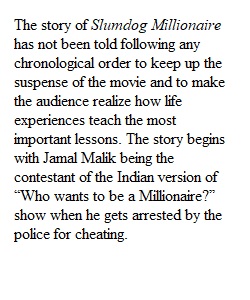


Q 1. Why is Slumdog Millionaire (2008) told out of chronological sequence? What events motivate the use of flashbacks? Analyze how this choice impacts the overall feel of the movie. Why choose not to tell the story in chronological order? 2. Like many other films, in Slumdog Millionaire the camera would be considered the primary narrator of the film. • o As the 'narrator,' the camera can be thought of as being objective or subjective. ? ? Objective: The camera is passive, much like watching an event from afar, but not taking an active role in the action. ? Subjective: The camera plays more of an active role, helping to convey what a character is seeing, feeling, experiencing, etc. o Do you think the camera's narration in Slumdog Millionaire would be considered mostly objective or does it convey subjective accounts and emotions? o To back up your opinion about the tone being objective or subjective, pick a particular moment in the film, describe what is happening and analyze its subjective or objective tone. Be sure to use character’s names – Jamal (protagonist), Salim (brother), Latika (female love interest), etc. Due: • Pt. 1: Answer discussion question(s) - Friday, 11:59pm CST of module 6. (at least 250 words total) • Pt. 2: Reply in a scholarly and substantive manner to at least 2 of your classmates - Sunday, 11:59pm CST of module 6. (approximately 75 words per reply)
View Related Questions